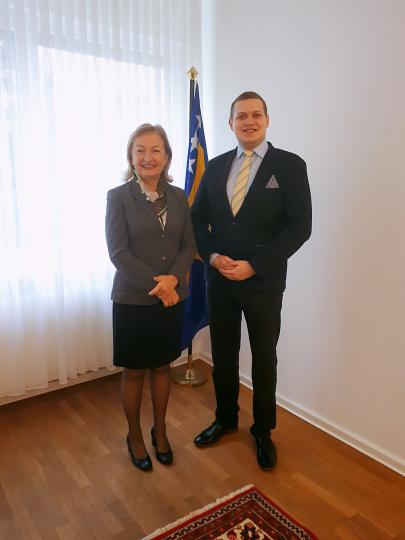1- Your Excellency, many young and highly qualified students from Bosnia and Herzegovina come to Germany to study. According to the DAAD, 3,331 students from Bosnia and Herzegovina were enrolled at German universities in the 2017/18 winter semester. How do you assess the great interest of your citizens in studying at German universities?
H.E.: There is a long tradition of exchange between Bosnia-Herzegovina and Germany. During the 1960s and 1970s, a large number of people were recruited into the German industry, working as so-called "guest workers". Thus, a large number of people from Bosnia-Herzegovina from that period live in Germany. Some of the current students who have come to Germany use these family networks and thus receive relief when studying in Germany.
During the Bosnian war in the 1990s, Germany then took in a large number of war refugees. Some of them went to school in Germany and speak German at a mother-tongue level. Many of them were sent back from Germany to BiH after the end of the war. They and their descendants therefore have a strong connection to Germany, feel familiar with the language and therefore often aim to study in Germany.
Last but not least, education in Germany and the economic situation are highly valued in the entire Balkan region.
2. In your opinion, what are the current hurdles for students from non-EU countries who gain access to German universities?
H.E.: Often they are the classical difficulties that most students face: questions about financing, accommodation, application procedures (keyword "Numerus Clausus"), etc.
3. What measures are necessary to remove these obstacles?
H.E.: Broader scholarship programmes and more guaranteed places, for example in halls of residence, would help. In addition, university cooperation between universities in Germany and Bosnia-Herzegovina would facilitate administrative procedures.

4. What are currently the major bilateral cooperation projects with Germany in the field of science and higher education?
H.E.: The exchange between certain universities, especially in the IT sector. There are also regional projects for scientific exchange.
5. What opportunities and perspectives do you see for your fellow citizens when they start their professional careers in Germany after their studies?
H.E.: The prospects are very good! Students who come to Germany from BiH for their studies are highly motivated. Usually family expectations are very high. Accordingly, they achieve good study results, are diligent and willing to build a good career in Germany.
6. What significance do the students from Bosnia and Herzegovina living in Germany have in the structure of bilateral relations?
H.E.: In Germany, a number of academic and student associations have developed (such as NBSAD e.V. - The German-Bosnian Network for Business, Education and Academy), which advocate close cooperation between the two countries. There are initiatives that support the exchange of lecturers, start-up entrepreneurs, etc. These students build up a transnational network and connect the two countries through their intensive exchange. Some of them return to BiH as entrepreneurs and employers, creating new jobs locally. At the same time, new markets are emerging for German entrepreneurs. It is a win-win situation due to the growing number of students from BiH in Germany.
7. How do you see the role of digital companies like Expatrio in facilitating access to higher education?
H.E.: In our estimation, most students use private or family networks and contacts to organize their studies in Germany. Students who begin their studies in Germany already have a supporting network that they use. Companies wishing to support such students (such as the Wunderkind Institute in Berlin) must be able to make it easier for those interested to organize their studies in Germany. The added value for the students must be recognizable, such as support with visa organisation or the search for accommodation.
